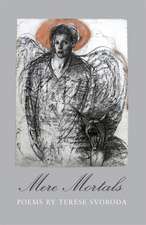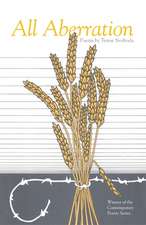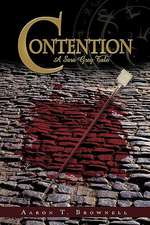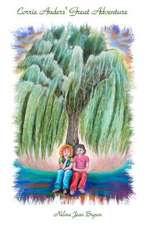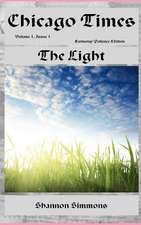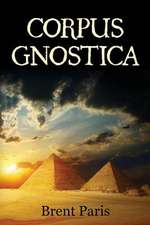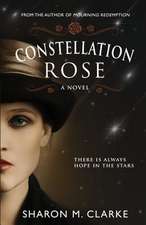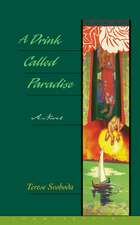Great American Desert: Stories
Autor Terese Svobodaen Limba Engleză Paperback – 11 mar 2019
Water, its use and abuse, trickles through Great American Desert, a story collection by Terese Svoboda that spans the misadventures of the prehistoric Clovis people to the wanderings of a forlorn couple around a pink pyramid in a sci-fi prairie. In “Dutch Joe,” the eponymous hero sees the future from the bottom of a well in the Sandhills, while a woman tries to drag her sister back from insanity in “Dirty Thirties.” In “Bomb Jockey,” a local Romeo disposes of leaky bombs at South Dakota’s army depot, while a family quarrels in “Ogallala Aquifer” as a thousand trucks dump chemical waste from a munitions depot next to their land. Bugs and drugs are devoured in “Alfalfa,” a disc jockey talks her way out of a knifing in “Sally Rides,” and an updated Pied Piper begs parents to reconsider in “The Mountain.” The consequences of the land’s mistreatment is epitomized in the final story by a discovery inside a pink pyramid.
In her arresting and inimitable style, Svoboda’s delicate handling of the complex dynamics of family and self seeps into every sentence of these first-rate short stories about what we do to the world around us—and what it can do to us.
In her arresting and inimitable style, Svoboda’s delicate handling of the complex dynamics of family and self seeps into every sentence of these first-rate short stories about what we do to the world around us—and what it can do to us.
Preț: 159.86 lei
Nou
Puncte Express: 240
Preț estimativ în valută:
30.59€ • 31.61$ • 25.45£
30.59€ • 31.61$ • 25.45£
Carte tipărită la comandă
Livrare economică 15-21 martie
Preluare comenzi: 021 569.72.76
Specificații
ISBN-13: 9780814255209
ISBN-10: 0814255205
Pagini: 200
Dimensiuni: 140 x 216 x 15 mm
Greutate: 0.25 kg
Ediția:1
Editura: Ohio State University Press
Colecția Mad Creek Books
ISBN-10: 0814255205
Pagini: 200
Dimensiuni: 140 x 216 x 15 mm
Greutate: 0.25 kg
Ediția:1
Editura: Ohio State University Press
Colecția Mad Creek Books
Recenzii
“Svoboda transports readers to a fantastical American West in this collection of stories that surprise, disturb, and amuse in equal measure.” –Publisher’s Weekly
“In Terese Svoboda’s expansive new short story collection, Great American Desert, her meticulous and lyrical prose brings these stories to life in ways that are often stunning, deeply felt, and uniquely perceptive. Taken alone, these stories—some of which are flash stories clocking in under four pages— provide their own vivid snapshots of lands and people frequently in contradiction with themselves. Taken as a whole, the collection is like layers of stratum that produce a beautiful yet ominous portrait of an ecosystem that’s given more than it can sustain, and people who have taken more than they deserve.” —Dylan Brown, Los Angeles Review of Books
“A devious and extraordinary new collection of stories from one of our best writers.” —Karen Russell, author of Swamplandia!
“[Svoboda’s] enigmatic sentences, elliptical narratives, and percussive plots delve into the possibilities of form, genre, and plausible futures, but always with an eye on the vast subterranean psychologies of her all-too-real creations.” —Kirkus Reviews (starred review)
“Terese Svoboda has brought a poet’s lyrical intensity and factual density to prose fiction and writes like no one else.” —Tom McGuane
“I read this as a new American Gothic where the endless flatness is not so much broken as broken open into utterly new dimensions. I’m blown away.” —Michael Martone, author of Michael Martone and Brooding
Notă biografică
Recipient of a Guggenheim, Terese Svoboda is the author of seventeen books of prose, poetry, memoir, translation, and biography, including six books of fiction—most recently, Bohemian Girl.
Extras
Camp ClovisSummer camp, boys’ footraces, showing off underwater, crafts with leather, spear point chiseling, campfires—the usual. Even Clovis boys camp, they get so troublesome in the village they are told to spend time elsewhere. Go roughhouse, they are told. Go work on your spear points and don’t bother us. These boys would like to think this is just the usual, that they have moved their fires downriver because they always do, it’s summer and that’s when they’re supposed to camp out. But this year there’s so few kills at home their mothers pack no jerky, there’s no mush and honey meal goodbye. Little food in the village means fights from who knows where, other hungry people, relatives or strangers—they will come at you. This makes everyone nervous. Stay out of the way, they are told.
Besides, they are supposed to watch the plants.
You don’t send grown men to watch plants, not even a field full of strange plants. Plants just don’t warrant the manpower. Women have to stay home to cook what there is, girls are all trouble. You send boys to camp beside the plants. The boys aren’t going anywhere, they are going to camp anyway. It’s summer.
These plants produce dreams. You eat one or two and wow. Then you retch, you have such a headache, your hands shake, but it’s worth it. Nobody had ever even seen these plants until a season ago. Some who tried their seeds never came back from their dreams they are so good. Imagine, a whole year of dreams. But somebody has to take care of you when you dream, somebody points out. It’s no picnic. And while you are dreaming, you can’t fight, says another. All the others shrug and look forward to harvest, when the boys’ guarding is over and the dreaming can start.
These boys are promised dream too by the end of the summer. If they’re old enough to camp, they can dream. That’s what their parents tell them. They don’t have any ritual for these plants going yet. Maybe the plants come from the moon―look at the lines across the leaves, all craggy, says an old man. Everybody checks out the moon but few see a resemblance. They rip up a plant or two and inspect its root for moon-ishness and then burn it―ah, the scent, the promise of dream.
If only the plants could tell them where the game has gone.
One old man thinks there is no game because they ate the last bison. They haven’t seen bison in three seasons, not since they ran that big herd over a cliff. The hunters deny that they took any more bison than usual, they say there are just fewer bison all around. Their wives spurn them. They love bison, cooked with sumpweed. The hunters retort that even the big deer is not rutting when it should. Maybe the deer have other wives, scoff their wives. The old man tries to suggest something spiritual is happening. The dancing leaves of the plant are like the fetlock of the bison and will lure them back, he says.
The wives say they see no game.
Spiritual or not, somebody has to watch these plants so they are not stolen or eaten by rats or coyotes or birds or die from drought. They are not game but maybe the boys will see game in their dreams and when they wake, they can go after them. Who better to guard them than these dreamy boys?
Besides, they are supposed to watch the plants.
You don’t send grown men to watch plants, not even a field full of strange plants. Plants just don’t warrant the manpower. Women have to stay home to cook what there is, girls are all trouble. You send boys to camp beside the plants. The boys aren’t going anywhere, they are going to camp anyway. It’s summer.
These plants produce dreams. You eat one or two and wow. Then you retch, you have such a headache, your hands shake, but it’s worth it. Nobody had ever even seen these plants until a season ago. Some who tried their seeds never came back from their dreams they are so good. Imagine, a whole year of dreams. But somebody has to take care of you when you dream, somebody points out. It’s no picnic. And while you are dreaming, you can’t fight, says another. All the others shrug and look forward to harvest, when the boys’ guarding is over and the dreaming can start.
These boys are promised dream too by the end of the summer. If they’re old enough to camp, they can dream. That’s what their parents tell them. They don’t have any ritual for these plants going yet. Maybe the plants come from the moon―look at the lines across the leaves, all craggy, says an old man. Everybody checks out the moon but few see a resemblance. They rip up a plant or two and inspect its root for moon-ishness and then burn it―ah, the scent, the promise of dream.
If only the plants could tell them where the game has gone.
One old man thinks there is no game because they ate the last bison. They haven’t seen bison in three seasons, not since they ran that big herd over a cliff. The hunters deny that they took any more bison than usual, they say there are just fewer bison all around. Their wives spurn them. They love bison, cooked with sumpweed. The hunters retort that even the big deer is not rutting when it should. Maybe the deer have other wives, scoff their wives. The old man tries to suggest something spiritual is happening. The dancing leaves of the plant are like the fetlock of the bison and will lure them back, he says.
The wives say they see no game.
Spiritual or not, somebody has to watch these plants so they are not stolen or eaten by rats or coyotes or birds or die from drought. They are not game but maybe the boys will see game in their dreams and when they wake, they can go after them. Who better to guard them than these dreamy boys?
Cuprins
Contents
Camp Clovis
Major Long Talks To His Horse
Dutch Joe
Dirty Thirties
Bomb Jockey
Ogallala Aquifer
Cordless in the Fifties
Sally Rides
Rods
Two Feet, Four Feet
Endangered Species
Alfalfa
Africa
All Mapped Out
Mennonite Forest
Mugsy
Prairie Dogs
Seconds
Hot Rain
The Mountain
Pink Pyramid
Acknowledgments[HMM1]
Camp Clovis
Major Long Talks To His Horse
Dutch Joe
Dirty Thirties
Bomb Jockey
Ogallala Aquifer
Cordless in the Fifties
Sally Rides
Rods
Two Feet, Four Feet
Endangered Species
Alfalfa
Africa
All Mapped Out
Mennonite Forest
Mugsy
Prairie Dogs
Seconds
Hot Rain
The Mountain
Pink Pyramid
Acknowledgments[HMM1]
[HMM1]AU: We have moved the acknowledgments to the BM. Can you confirm that this is ok? Or, would you prefer it in the front matter?
Descriere
Stories from prehistoric times to the future, about land, our abuse of the land, and the impact on the people who come after




